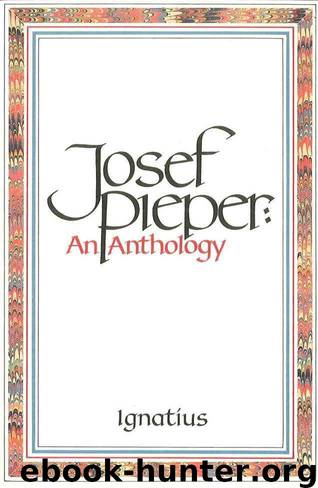An Anthology by Josef Pieper

Author:Josef Pieper
Language: eng
Format: mobi, epub
Tags: Religion, Philosophy, Catholicism, Christianity
ISBN: 9780898702262
Publisher: Ignatius Press
Published: 2011-06-15T00:00:00+00:00
46
The “Intellectual” and the Church47
Recently I was invited to participate in a public debate on the subject of “intellectuals and the Church”. At the time I wondered whether I myself could be considered a member of that group which we were supposed to discuss. Would other people describe me as an “intellectual”? And would I be willing to accept this designation? My answer to both questions is: Probably not! But whom do we have in mind when we speak of the “intellectual”? And more specifically, what do we mean by this word as it is used in modern German, as opposed to French or English, in which it appears to have a somewhat different meaning? Naturally the term intellectual refers to someone who has attained a certain degree of knowledge, of education, of critical awareness. But this is not the distinguishing mark of the intellectual, for a person can be an outstanding scientist and yet not be classified as an intellectual. One becomes an intellectual only by virtue of a certain attitude toward the “status quo”, “the Establishment” or “the system”, the existing order. Thus phrases like “The Intellectual and the Church” are highly typical. We might just as easily say, “The Intellectual and the State”, “. . . and the Family”, “. . . and the University”. If we examine the “and” more closely, we find that it implies the attitude of critical detachment, the principle of reserving one’s judgment, the intention not to identify oneself with, and not to sanction, the phenomenon in question. Moreover, at the same time it implies at least the propensity to the public expression or promulgation of one’s views.
For example, in relation to the university, who is an “intellectual”? Whom do we really have in mind when we use this word? Certainly a German would not apply the term to the “ordinary professor” who has a “steady job” at a university, especially if he happens to be the dean of a faculty or a rector! On the other hand, in relation to the Church a professor, even a professor of theology, might very well be designated an “intellectual”, although of course he would lose all claim to this title the moment, let us say, that he was appointed a bishop. Clearly, in such a case no change whatever would have occurred in his intellectual competence to form judgments. The change would have been in his relationship to the institution [in this case the Church]. At least initially, anyone employed by an institution is assumed to identify with it. If a renowned journalist becomes the official spokesman of the government, he automatically ceases to qualify as an “intellectual”. As an author who wrote on theological subjects, Jean Danielou was an “intellectual”; but clearly intellectuals ceased to accept Danielou as one of their own as soon as he became a cardinal.
Thus one element in the concept of the (German) intellectual is the fact that he is an “outsider”, that he does not belong, that he does not wish to be identified with certain phenomena.
Download
This site does not store any files on its server. We only index and link to content provided by other sites. Please contact the content providers to delete copyright contents if any and email us, we'll remove relevant links or contents immediately.
The remains of the day by Kazuo Ishiguro(8981)
Tools of Titans by Timothy Ferriss(8369)
Giovanni's Room by James Baldwin(7330)
The Black Swan by Nassim Nicholas Taleb(7111)
Inner Engineering: A Yogi's Guide to Joy by Sadhguru(6785)
The Way of Zen by Alan W. Watts(6603)
Asking the Right Questions: A Guide to Critical Thinking by M. Neil Browne & Stuart M. Keeley(5762)
The Power of Now: A Guide to Spiritual Enlightenment by Eckhart Tolle(5760)
The Six Wives Of Henry VIII (WOMEN IN HISTORY) by Fraser Antonia(5505)
Astrophysics for People in a Hurry by Neil DeGrasse Tyson(5182)
Housekeeping by Marilynne Robinson(4436)
12 Rules for Life by Jordan B. Peterson(4299)
Double Down (Diary of a Wimpy Kid Book 11) by Jeff Kinney(4261)
Ikigai by Héctor García & Francesc Miralles(4248)
The Ethical Slut by Janet W. Hardy(4243)
Skin in the Game by Nassim Nicholas Taleb(4240)
The Art of Happiness by The Dalai Lama(4125)
Skin in the Game: Hidden Asymmetries in Daily Life by Nassim Nicholas Taleb(3993)
Walking by Henry David Thoreau(3953)
